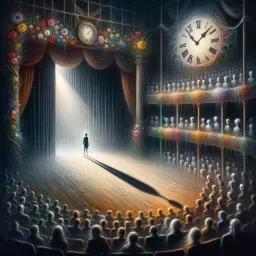”There was never yet philosopher that
could endure the toothache patiently“

0
0
0
0
- Meaning
- This quote suggests that even the wisest and most philosophical of individuals, those who can poetically ponder the mysteries of life and provide sage advice, are still susceptible to the immediate and often unbearable physical pains that afflict everyone. A toothache serves here as a metaphor for any physical suffering that can disrupt even the calm composure typical of philosophers.
- Allegory
- The aged philosopher, representing wisdom and knowledge, is shown in a moment of physical suffering to emphasize the unavoidable nature of pain. The grand library with ancient books and scrolls highlights the depth of his intellect. His contorted face and hand on his jaw forcefully contrast with his usually composed demeanor, symbolizing how pain affects everyone equally. The ethereal, glowing thoughts depict the struggle to maintain intellectual clarity during physical distress. The calm scene outside the window serves as a juxtaposition to his inner turmoil, reflecting the disconnect between personal suffering and the unaffected world. This visual metaphor vividly brings to life the concept that even the wisest among us are not immune to the trials of physical suffering.
- Applicability
- In personal life, this phrase serves as a humbling reminder that no matter how intellectual or composed we may be, we are all subject to the same physical frailties. It’s a call for empathy and understanding, encouraging us to be patient with others (and ourselves) when they are in pain, recognizing that suffering is an inherent part of the human condition.
- Impact
- Shakespeare's works, including this quote, have had a profound impact on literature, drama, and the English language. This particular quote reflects Shakespeare’s ability to blend humor with poignant truths about the human condition. It has been cited and referenced in various cultural contexts, emphasizing the universality of human experiences, regardless of time period.
- Historical Context
- Shakespeare wrote "Much Ado About Nothing" likely in the late 1590s. During this time, England was experiencing the Elizabethan era, a period of relative peace and prosperity that saw a flowering of English drama, music, and poetry. The cultural milieu of this era valued wit, wordplay, and the exploration of human experiences and emotions, elements clearly reflected in Shakespeare's works.
- Criticisms
- While Shakespeare's phrase is generally accepted and appreciated for its wit and insight, one could argue that it downplays the capabilities of philosophers or intellectuals to deal with physical pain. However, this argument misses the humorous context in which Shakespeare often wrote, where exaggeration was used to highlight a deeper truth.
- Variations
- Variations of this phrase can be found in different cultures, often highlighting the human incapacity to fully conquer physical distress irrespective of intellectual prowess. For instance, a similar sentiment might be echoed in idioms from other cultures that equate physical pain with vulnerability, reminding us of our shared human fragility.
-

The empty vessel makes the loudest sound.
-

The smallest worm will turn, being trodden on.
-

The quality of mercy is not strain'd, it droppeth as the gentle rain from heaven upon the place beneath.
-

There are more things in heaven and earth, Horatio, than are dreamt of in your philosophy.
-

O, beware, my lord, of jealousy; It is the green-ey'd monster which doth mock the meat it feeds on.
-

I will praise any man that will praise me.
-

O, what a rogue and peasant slave am I!
-

It is a wise father that knows his own child.
-

Life's but a walking shadow, a poor player that struts and frets his hour upon the stage and then is heard no more.
-

Journeys end in lovers meeting.
No Comments